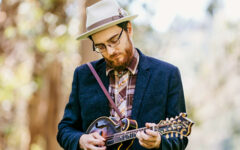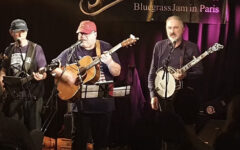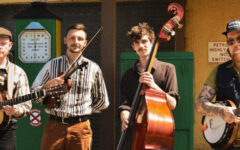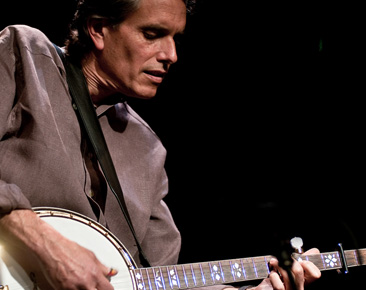
 Keith Little, much acclaimed singer, multi-instrumentalist, songwriter and performer who has recorded and toured with the likes of Rose Maddox, California bluegrass pioneer Vern Williams, Dolly Parton, Ricky Skaggs & Kentucky Thunder, The Chieftains, David Grisman and Peter Rowan, has graduated to leading his own band, The LittleBand.
Keith Little, much acclaimed singer, multi-instrumentalist, songwriter and performer who has recorded and toured with the likes of Rose Maddox, California bluegrass pioneer Vern Williams, Dolly Parton, Ricky Skaggs & Kentucky Thunder, The Chieftains, David Grisman and Peter Rowan, has graduated to leading his own band, The LittleBand.
Through his role as band member and sideman, Little’s musical contributions, vocal and instrumental, and including work on three Grammy-winning albums, are known more widely than his name.
Formed last summer, with Michael Witcher (resonator guitar), Josh Tharp (banjo), Luke Abbott (fiddle and mandolin), Steve Swan (bass) and occasionally special guest Blaine Sprouse (fiddle), providing good solid support.
Little, himself, plays the guitar with some subtleties transferred from his very adept banjo playing, while one commentator has said of his singing, [he] “can launch his clear tenor voice into bluegrass’ classic ‘high lonesome sound’ or sing with soft poignancy.”
The quintet frequents the west coast, having already played at the prestigious Strawberry Music Festival last September, and offers traditional and original bluegrass, acoustic Country and Gospel music.
Keith Little is from Sonora, in the Sierra Nevada foothills of northern California, and having been introduced to music by his father, he quickly learned to play the guitar, banjo, mandolin and fiddle.
In 1969, aged 13, he had his first professional engagement. Shortly afterwards Little was introduced to local bluegrass legends Vern Williams and Ray Park. This led to a long tenure as a key member of the Vern Williams Band. In the intervening years he worked with Rose Maddox, the Grant Street String Band, High Country and the Country Gentlemen.
Latterly, Little has played with Ricky Skaggs & Kentucky Thunder, Lonesome Standard Time, the David Grisman Bluegrass Experience and the Peter Rowan Bluegrass Band. He has also made many stage appearances with friend and collaborator Jim Nunally.
Little has recorded with almost all the bands with which he has played, and contributed to recordings released by Frank Wakefield, the Chieftains and Dolly Parton.
An extremely accomplished singer with a wide vocal range, he sang lead on various artists’ outings on All Night Gang and Schoolhouse, both albums featuring many of Nashville’s wide-ranging bluegrass fraternity of the time. Little’s singing is well-showcased on his first solo album Distant Land to Roam and a more-recent Butch Baldassari tribute album The Road Home that features his own song The Gift.
Little is an excellent songwriter. His compositions have been recorded by Vern Williams, the Country Gentlemen, Longview, Tim O’Brien, Claire Lynch, the Whites and Crystal Gayle (among others).
He has had his own recording studio since building his first in 1979.
Now, after a 45-year performing career, Little has found a very satisfying niche leading The LittleBand.
When did you decide that you wanted to front a band and how did the band evolve?
 “I see motivation for band forming resulting from a natural process of artistic unfolding. In my case, it’s taken shape over the years as I’ve grown in my ability to present it. Though I play a number of instruments, I’m primarily a singer who started on guitar. Two important aspects drew me to music as a youngster.., first was the sound of the acoustic guitar. I was always captivated by it, and vividly remember resting my ear on the upper bout of my father’s guitar, listening to the tone of the open strings, played one by one.., totally mesmerised by the growl of the bass notes with those shimmering treble overtones. It was like some fine kind of magic potion, I suppose.
“I see motivation for band forming resulting from a natural process of artistic unfolding. In my case, it’s taken shape over the years as I’ve grown in my ability to present it. Though I play a number of instruments, I’m primarily a singer who started on guitar. Two important aspects drew me to music as a youngster.., first was the sound of the acoustic guitar. I was always captivated by it, and vividly remember resting my ear on the upper bout of my father’s guitar, listening to the tone of the open strings, played one by one.., totally mesmerised by the growl of the bass notes with those shimmering treble overtones. It was like some fine kind of magic potion, I suppose.
The second aspect that drew me in, was the animation of performance, and performers. I was raised in the mountains of California, relatively isolated from access to pop culture and entertainment. My entire family played music, and my normally stoic father would transform into a vivacious entertainer whenever he had an instrument in his hands. I remember standing on a fruit lug box, imitating ‘performing’ around this time.., also very powerful medicine. The tone of the guitar and the art of performing got me started, and once on the music trail I’ve never really looked back. The guitar is a singer’s companion for sure, and while singing lead or composing, it’s always my first choice.
The LittleBand basically formed when I was offered a couple of nice shows in the summer of 2013. I was able to recruit players who have a similar love for, and attitude regarding music and music making. They’re all multi-instrumentalists, and have a deep knowledge of the recorded bluegrass lexicon. This is an essential ingredient in my opinion, allowing the group a common place to build from, and also gives our material musical authenticity.
I first met our fiddler and mandolinist at a festival campsite jam. I liked Luke Abbott’s timing and tone right away, and after he quoted a Ralph Mayo solo from a Stanley Brother’s recording, I knew he had real depth. Similarly, I met our banjo player at another jam. Josh Tharp was playing mandolin and singing harmony on Gospel songs. I knew he had experience as a touring banjo player, but hearing him sing really inspired me. Both Josh and Luke have fabulous voices, and great ears for harmony. Michael Witcher and I had been bandmates with Peter Rowan for a year or so prior, and safe to say I’m a big fan of Michael, and knew his potential well. He’s one of the finest Dobro players going, and also has a great singing voice. Steve Swan is the band member I’ve known the longest period of time, and have always loved his string bass tone and where he puts the note. He’s been around the SF bay area music scene for many years, and was available when I called.
The band met at my place to rehearse on the day before our first gig, and that’s how it started. The LittleBand is the most enjoyable assemblage of musicians I’ve ever been around, and has allowed me to unfold as a bandleader.”
What are your thoughts on leading the band since then?
“It’s the best thing I’ve done of late, and has tremendous artistic meaning for me. I came to the group with a sack full of material that was seldom performed in a band setting… songs I’d composed, and others from musical traditions that have meaning for me. The songs were fairly well arranged from performing solo, and I was comfortable pulling them off by myself. From our first rehearsal, I’ve encouraged the band to be free to add and subtract at will, knowing that I trust their innate musical sense, and that they respect mine. It’s been joyous to hear the songs fleshed out, and to receive the audience feedback. Very inspiring indeed. The end result has revitalised me as a musical artist.
How would you describe your approach to leading a band?
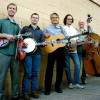 “The LittleBand isn’t my first outing by any means. I’ve started many bands over the past 45 years, some managed to last, others didn’t. I’ve also played guitar and have been the lead singer in various other groups, singing and playing that particular group’s music. The LittleBand is my first outing as a creative leader.., or ‘soup stock’ if you will. I bring the basic recipe to rehearsal, and the rest of the band adds spices, colors and finishes the dish. We all have a say in how this happens, which gives the presentation real strength. I view the bandleader role more as a ‘designated driver,’ than a ‘boss,’ and the job description comes with an entirely new skill set that is both exciting and challenging. Onstage, I’m the one who sets the tone for the performance. I consciously set out in a relaxed manner, allowing the band to perform at a high level, while giving the audience a chance to feel at ease. Again, it’s a natural process, and I’m happy to say that I enjoy the gig. The other band members are very supportive, and I’m excited to be along for the ride.”
“The LittleBand isn’t my first outing by any means. I’ve started many bands over the past 45 years, some managed to last, others didn’t. I’ve also played guitar and have been the lead singer in various other groups, singing and playing that particular group’s music. The LittleBand is my first outing as a creative leader.., or ‘soup stock’ if you will. I bring the basic recipe to rehearsal, and the rest of the band adds spices, colors and finishes the dish. We all have a say in how this happens, which gives the presentation real strength. I view the bandleader role more as a ‘designated driver,’ than a ‘boss,’ and the job description comes with an entirely new skill set that is both exciting and challenging. Onstage, I’m the one who sets the tone for the performance. I consciously set out in a relaxed manner, allowing the band to perform at a high level, while giving the audience a chance to feel at ease. Again, it’s a natural process, and I’m happy to say that I enjoy the gig. The other band members are very supportive, and I’m excited to be along for the ride.”
From all the bandleaders with whom you played what aspects of leading a band did you learn?
“I picked up something from all of them really. Early on, I wrestled with the notion of being a professional musician, especially coming from a rural working class background. The closest thing to a performing artist where I came from was the town preacher, I suppose. Eventually, I accepted the idea of a sanctified occupation to be ‘loving what you do, and valuing it enough to make it your own.’
Here’s a few quotes I found useful from the early days, starting with Vern Williams, ‘We can’t expect everybody to like our music, but if we love performing it, those who may not appreciate us at first, will eventually give way.’ From Rose Maddox, ‘There’s no secret to being an entertainer, just allow your natural self to come through, and let it show.’ From Ray Park, ‘I play music for the fun of it, but the more money we make, the funnier it is.’ Later on (and from other bandleaders), I learned as much of what limits artistic growth, as what allows it to grow. Often times the limiting factors have nothing to do with music, or musicianship, but are the result of something more personal. An attitude, or preconceived notion of something unrelated to performing, that winds up limiting the band. I’ve come to the bandleader gig later in life than most, and have learned plenty from every musical situation I’ve been in. For me, the most meaningful bands were ones in which we shared a common musicality, and where I was respected and allowed to contribute something of myself to the sound. It’s a matter of mutual respect, and love for the music.”

